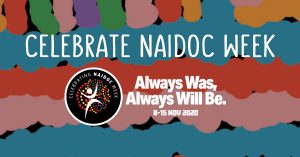This year we are celebrating NAIDOC Week from 8 – 15 November 2020. NAIDOC Week was once a day celebrated by Aboriginal and Torres Strait Islander peoples but has now become an important week for all Australians to celebrate and appreciate Aboriginal and Torres Strait Islander people, history and culture.

The NAIDOC Week theme for this year is ‘Always Was, Always Will Be’ which focuses on Aboriginal and Torres Strait Islander peoples’ continuous connection to country and culture. The richness and survival of Aboriginal and Torres Strait Islander culture is essential. However, Australian law fails to recognise properly the importance of Aboriginal and Torres Strait Islander culture and Aboriginal and Torres Strait Islander peoples’ rights to protect their intellectual property, which is also known as Indigenous Cultural and Intellectual Property (ICIP).
ICIP encompasses different aspects of Indigenous culture, including, stories, symbols, sacred sites, dances, ceremonies etc. While you could write a story and it would fall under copyright, if it meets the specific requirements under the Copyright Act 1968 (Cth), there are roadblocks which prohibit ICIP from being protected by copyright. In particular, the requirements of ‘material form’ (e.g. written down or recorded) and there being an ‘author’ poses problems as Aboriginal and Torres Strait Islander stories are told orally, and a community may be the owner of a story rather than a person. The duration of copyright which can last for 25, 50 or 70 years after the creator’s death, the first year of publication/broadcast, since being made or made public, depending on the work is also problematic for ICIP. We know that Aboriginal and Torres Strait Islander people and culture have been around for more than 65,000 years, which means that particular ICIP may be older than the current duration period of copyright.
Aboriginal and Torres Strait Islander people and various organisations have advocated for the recognition of ICIP in Australia. Dr Terri Janke and Company have done great work to educate people about the importance of recognising and respecting ICIP as well as protocols to follow regarding the use of ICIP. Also, in 2016, the Arts Law Centre of Australia, Indigenous Art Code and Copyright Agency started the ‘Fake Arts Harms Culture campaign’, which highlighted issues with fake Aboriginal and Torres Strait Islander art and the lack of protection of ICIP. In September 2020, the ‘Australian Government response to the House of Representatives Standing Committee on Indigenous Affairs—Report on the impact of inauthentic art and craft in the style of First Nations peoples’ recognised the problems with current intellectual property laws and the need start looking into the development of ICIP legislation. While the Government has said this will be a long process, hopefully, we will see the introduction of ICIP laws sooner rather than later.
Author: Sharna White, Graduate Lawyer
influence legal acknowledges the Traditional Custodians of Country across Australia. We recognise the strength, resilience and capacity of Aboriginal and Torres Strait Islander Peoples and pay respect to Elders past and present.
